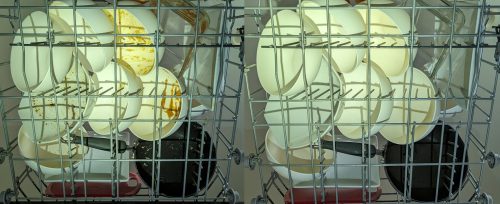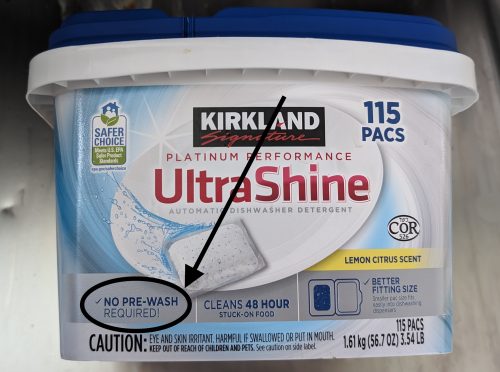I’ve used a dishwasher the wrong way for most of my life. I used to scrape and rinse my dishes before putting them into the dishwasher, which was a waste of time and heated water.
Thanks to my two teenagers, who do most of the dishwasher chores in my house, I’ve finally learned how to load a dishwasher. You simply scrape the big chunks of food off your plates and bowls, then load ’em. Even if you won’t run the dishwasher until the next day, do it. Even if you have dried-on food on your dishes, do it. It works.
I can’t tell you how many times I’ve silently scoffed at my daughter confidently loading long-lost bowls of rock-hard, dried-up food… only to have them come out looking as clean as everything else in the dishwasher. The before and after pics of a random load at my house illustrate this nicely.
Dishwasher manufacturers agree: stop rinsing
Some dishwasher manufacturers are bold enough to tell you not to pre-rinse. Here are snippets from a few user manuals:
Bosch: “Do not pre-wash items with loosely attached soiling. Remove all food particles, bones, toothpicks and excessive grease. Items having burned-on, baked-on or starchy soils may require some pretreatment.”
GE: “No pre-rinsing of normal food soil is required. Scrape off hard soils, including bones, toothpicks, skins, and seeds. Remove leafy vegetables, meat trimmings, and excessive amounts of grease or oil.”
Jennair: “Scrape food from dishes prior to loading (do not pre-rinse).”
Detergent manufacturers agree: stop rinsing
Dishwasher detergent manufacturers make bold claims about their detergents, too. Cascade says the following about pre-rinsing:
“As long as your dishes are properly loaded, even tough, burnt, stuck-on food is broken down so it can be washed away inside your machine. And get this: The enzymes actually work BETTER if you don’t pre-wash your dishes, because without food to attack, their cleaning power is underutilized. By not prewashing, you’ll end up with cleaner dishes while saving time and water, as Cascade and your dishwasher work in unison to eliminate stuck-on food and their residue. Cascade’s enzymes work best when they have something to latch onto – so let the enzymes do the work!”
I use the dishwasher packs sold at Costco under the Kirkland brand. The package says “NO PRE-WASH REQUIRED!”
And they’re right.
Also, try using less detergent
More detergent usually won’t give you cleaner dishes, but it might cause your glassware to look hazy. If you don’t use dishwasher packs, try using half as much detergent as you currently use to see if your dishes still come out clean. I’ve heard from appliance professionals that one of the more frequent causes of dishwasher problems is caused by people using more detergent than needed.
Summary
If you’re like me and you’re used to pre-rinsing your dishes so much that you hardly need a dishwasher, try skipping the pre-rinse for once. You might be pleasantly surprised. And you have the potential to save a lot of time and water.




George Robertson
August 2, 2024, 11:33 am
Do yo know what a turbitity sensor is?
Reuben Saltzman
August 2, 2024, 11:48 am
No. My Google machine tells me that turbidity sensors “measure the amount of light that is scattered by the suspended solids in water. As the amount of total suspended solids (TSS) in water increases, the water’s turbidity level (and cloudiness or haziness) increases.”
I’m assuming a dishwasher uses one of these devices to decide when to dump dirty water and add clean water to a wash cycle?